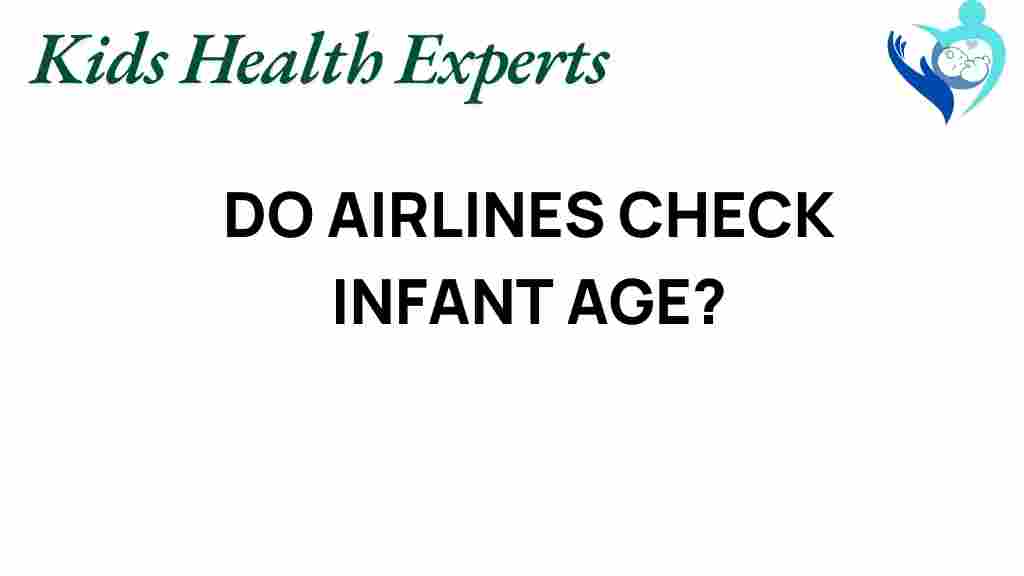Do Airlines Verify Infant Age? Understanding Travel Policies
Traveling with infants can be a delightful yet challenging experience for families. As more parents opt for family travel, a common question arises: do airlines verify infant age? Understanding the airline regulations surrounding age verification is crucial for a smooth journey. In this article, we will unpack the policies that govern flying with infants, including safety measures, documentation requirements, and tips for hassle-free travel with children.
Understanding Airline Policies on Infant Age Verification
When flying with infants, it’s essential to be aware that different airlines have varying policies regarding infant age verification. Typically, infants are classified as children under two years of age. They may be allowed to travel on a parent’s lap without requiring a separate seat, but this often depends on the airline’s specific regulations.
Most airlines do require proof of age for infants traveling on discounted fares or when a seat is purchased. This is to ensure compliance with their travel policies and safety measures. Here’s a breakdown of what you need to know:
- Age Limits: Airlines often define an infant as a child who is under 2 years old at the time of travel.
- Documentation: A birth certificate, passport, or other official document may be required for age verification.
- Discounted Fares: Infants traveling on a parent’s lap usually qualify for a discounted fare.
Step-by-Step Guide to Flying with Infants
When planning to fly with your infant, follow this step-by-step guide to ensure you meet all airline regulations and avoid any last-minute issues:
Step 1: Check Airline Policies
Before booking your flight, research the specific policies of the airline you plan to use. Most airlines have detailed information on their websites regarding:
- Age limits for infants
- Requirements for documentation and age verification
- Fees associated with traveling with an infant
Step 2: Prepare Documentation
Gather the necessary documents for age verification. Depending on the airline, you may need:
- A birth certificate
- A passport (if traveling internationally)
- Any other official document that proves the infant’s age
Step 3: Make a Reservation
When booking your flight, indicate that you are traveling with an infant. Some airlines allow you to reserve a seat for your infant at a discounted rate, while others may require you to book a separate ticket if you’re using a car seat.
Step 4: Confirm Your Booking
After booking, confirm your reservation with the airline. Ensure that all details are correct, including the infant’s age and the required documentation. It’s a good practice to contact the airline directly to verify their travel policies regarding infants.
Step 5: Check-In and Age Verification
When checking in at the airport, be prepared to present the documentation that verifies your infant’s age. This step is crucial, especially if your infant qualifies for a discounted fare or if you have booked a separate seat.
Troubleshooting Tips for Traveling with Infants
Even with careful planning, issues can arise when traveling with infants. Here are some troubleshooting tips to help you navigate common challenges:
- Documentation Problems: If you forget your infant’s documentation, contact the airline immediately. Some may allow you to provide documentation electronically or offer alternative solutions.
- Seating Issues: If you’ve booked a separate seat but encounter problems at check-in, don’t hesitate to speak with customer service. They can often resolve seating issues on the spot.
- Flight Changes: If your flight is changed or canceled, be aware that your infant’s documentation may need to be presented again. Always have it handy.
Safety Measures for Flying with Infants
Airlines implement various safety measures to ensure the well-being of infants during flights. Here are some key safety measures to consider:
- Infant Life Vests: Airlines provide infant life vests for emergency situations. Ensure that you know where these are located.
- Specialized Seatbelts: For infants seated in their own seats, airlines provide specialized seatbelts to secure them safely.
- Cabin Pressure and Ear Pain: During takeoff and landing, the change in cabin pressure can cause discomfort for infants. Encourage them to suck on a pacifier or bottle to alleviate ear pain.
Traveling Internationally with Infants
Traveling internationally with infants introduces additional considerations. Here’s what you need to know about travel with children across borders:
- Passport Requirements: Infants require a valid passport for international travel.
- Visa Regulations: Check if your destination country requires a visa for infants.
- Health Documentation: Some countries may require proof of vaccinations or health insurance for infants.
For more detailed information on international travel requirements, refer to the U.S. State Department’s travel website.
Conclusion
In conclusion, yes, airlines do verify infant age, and understanding the policies surrounding travel with children is vital for a smooth travel experience. By following the outlined steps, preparing the necessary documentation, and being aware of safety measures, families can confidently embark on their journeys with infants. Make sure to check with your chosen airline for their specific regulations to ensure compliance and a hassle-free travel experience.
For additional resources on family travel and tips for flying with infants, visit our travel guide.
This article is in the category Care and created by KidsHealthExperts Team
